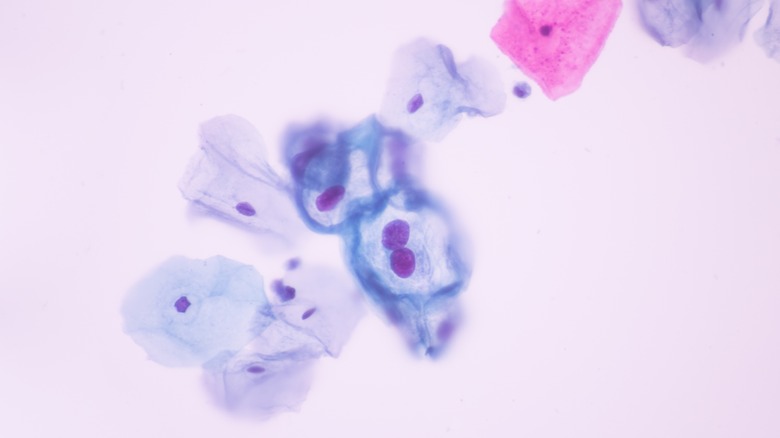Why Biopsies Are So Important
A biopsy is generally a simple procedure that involves taking a piece of tissue from the body and carrying out tests or looking at it under a microscope to determine if there's a problem, states WebMD. There are various types of biopsies that are performed depending on the type of tissue and its location on or in the body.
One common type of biopsy is called a needle biopsy. As its name implies, a needle biopsy uses a very fine needle to sample a piece of tissue, per Stanford Healthcare. A doctor will use image-guiding equipment to ensure they're removing the tissue from the right place inside the body. If the worrisome tissue is located on the surface of the body, a doctor will perform a skin biopsy, which utilizes a needle to take the sample. This is done under local anesthesia to prevent pain. The open biopsy is one of the most invasive, as it involves cutting open the body to gain direct sight of the tissue and taking a sample from there.
Once the biopsy is complete, the tissue will be sent away for analysis, explains Healthline. You can expect results within a handful of days in most cases, although this may take a few weeks in other instances. While the results will show whether the tissue sampled has any general abnormalities, there's another important reason why they are performed.
Biopsies are used to diagnose cancer
You may have already heard of the biopsy procedure within the context of cancer. While it can also identify other issues, such as cirrhosis in the case of hepatitis (per WebMD), it is normally used to detect the presence of cancer cells, explains the Mayo Clinic. Not only is it a tool for determining whether certain cells in the sampled tissue are cancerous, but it can also tell you where those cells originated in the body and the severity of the cancer. In other words, the biopsy can determine the stage of cancer, identify the size of a tumor, and determine whether it has spread to other areas of the body, per the Cleveland Clinic. Depending on the information gathered from the biopsy, a medical provider can identify the best course of treatment.
Nowadays, biopsies serve another important purpose when it comes to identifying and diagnosing cancer. Within the field of molecular medicine, they can now be used to determine how an individual will respond to various treatments for their cancer, as well as predict disease progression, as per a 2016 review published in The Cancer Journal. This is due to the presence of certain biomarkers within the cancerous cells that provide a molecular profile for specific cancers. Based on this, a doctor can recommend clinical trials specifically designed for a cancer's profile, giving a diagnosed individual more opportunities to treat their illness.


